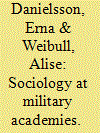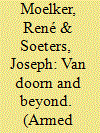| Srl | Item |
| 1 |
ID:
133452


|
|
|
|
|
| Publication |
2014.
|
| Summary/Abstract |
The officer corps of the U.S. Coast Guard, like that of the Navy, is organized around several operational communities. Response Ashore comprises officers who staff the service's 35 sectors and carry out the responsibilities of the captain of the port, search-and-rescue mission coordinator, federal on-scene coordinator, and federal maritime-security coordinator. They execute search and rescue, pollution response, maritime security, law enforcement, and all-hazards response, as well as overseeing the Coast Guard's small-boat stations and patrol boats.
|
|
|
|
|
|
|
|
|
|
|
|
|
|
|
|
| 2 |
ID:
083736


|
|
|
|
|
| Publication |
2008.
|
| Summary/Abstract |
This article illustrates the role of sociology at the Swedish military academies. Finding a suitable balance between theoretical and practical education seems to have been a major thread in Swedish officer education from the eighteenth century to the present day. The emphasis has been on education that is closely linked to military war positions, with extensive elements of combat planning and carrying out military operations. But as tasks have changed, areas such as leadership and organizations have become more important, and the positions of sociological theories and perspective have gradually increased. The belief put forward here is that the demand for sociology will increase for two reasons: the current struggle to make Swedish officer education more university-like and, more important, the need for sociological knowledge that will grow the more the Defense Forces will be engaged in the international arena.
|
|
|
|
|
|
|
|
|
|
|
|
|
|
|
|
| 3 |
ID:
083733


|
|
|
|
|
| Publication |
2008.
|
| Summary/Abstract |
In the 1960s, Jacques van Doorn started teaching (military) sociology as a formal, scientific discipline at the Netherlands Military Academy. Since then, the way military sociology was taught at the academy has seen a great number of developments; the philosophy of education at the academy changed into an interdisciplinary and problem-based learning approach. These changes evolved into military sociology becoming a recognized perspective for analyzing military operations while being valued for its contribution to the functioning of future officers. With this shift, military sociology has developed a more pragmatic character. Even though theoretical development has sometimes been hampered by this preoccupation with pragmatics, in most times the blending of theory and praxis has stimulated the development in this field of knowledge
|
|
|
|
|
|
|
|
|
|
|
|
|
|
|
|